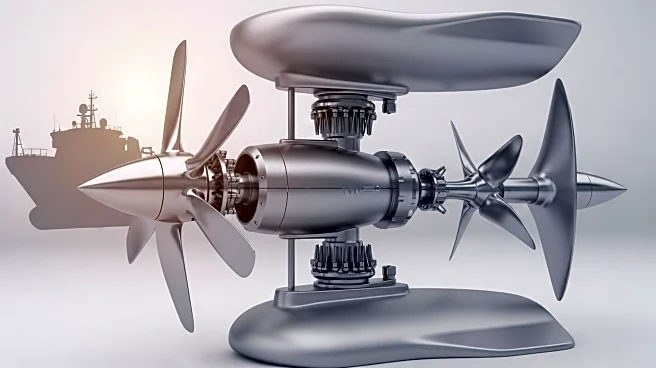What's Happening?
Steerprop, a Finnish propulsion specialist, has been selected to supply its Next Generation Contra-Rotating Propeller (CRP) azimuth propulsion systems for a new research vessel being built by Lloyd Werft Bremerhaven GmbH for the German Aerospace Center (DLR). The vessel, designed as a floating laboratory, will focus on maritime research and sustainable shipping solutions. It will feature Steerprop's CRP technology, which offers enhanced propulsion efficiency and fuel economy. The vessel will conduct research voyages in the North Sea and Baltic Sea, providing a platform for testing maritime energy systems under real-life conditions.
Why It's Important?
The collaboration between Steerprop and the German Aerospace Center represents a significant advancement in maritime research and sustainable shipping technologies. The use of Steerprop's CRP technology is expected to improve propulsion efficiency, contributing to the maritime industry's efforts to reduce carbon emissions and enhance energy efficiency. The research vessel will serve as a critical resource for studying fuel performance and operational impacts, supporting the industry's push towards decarbonization. This project highlights the importance of innovation in addressing environmental challenges in the shipping sector.
What's Next?
The construction of the research vessel is underway, with Steerprop set to deliver the propulsion units as part of its comprehensive supply scope. The vessel's deployment will enable extensive research on maritime energy systems, providing valuable data for industry stakeholders. The collaboration may lead to further partnerships between Steerprop, DLR, and other academic and industry partners, fostering innovation in sustainable shipping solutions. The vessel's findings could influence future maritime policies and practices, promoting environmentally friendly technologies.
Beyond the Headlines
The project underscores the growing importance of international collaboration in addressing global environmental challenges. It highlights the role of research and development in driving technological advancements and supporting the transition to sustainable energy systems. The vessel's unique capabilities may inspire similar initiatives in other regions, contributing to a broader shift towards greener maritime practices. The focus on real-world testing aligns with the industry's need for practical solutions to achieve sustainability goals.











